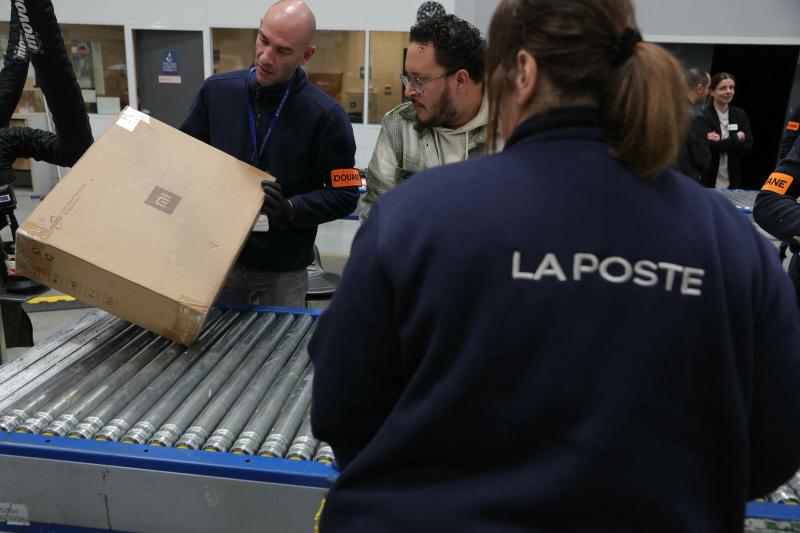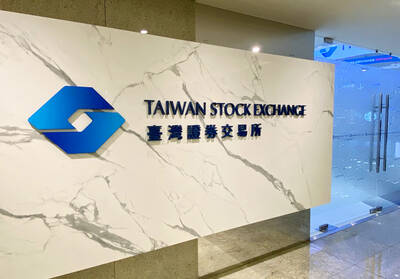Postal traffic to the US plunged more than 80 percent following Washington's imposition of new tariffs, with 88 operators worldwide fully or partially suspending services, the Universal Postal Union (UPU) said on Saturday.
The UPU, the United Nations' postal cooperation agency, is working on "the rapid development of a new technical solution that will help get mail moving to the United States again," its director general Masahiko Metoki said in a statement.
US President Donald Trump's administration announced in late July that it was abolishing a tax exemption on small packages entering the US from Aug. 29.

Photo: Thomas Samson, AFP
The move sparked a flurry of announcements from postal services, including in Australia, Britain, France, Germany, India, Italy and Japan, that most US-bound packages would no longer be accepted.
The UPU said data exchanged between postal operators via its systems showed that traffic to the US was down 81 percent on Aug. 29, compared to a week earlier.
"Furthermore, 88 postal operators informed the UPU they have suspended some or all postal services to the US until a solution is implemented," it said.
These included operators in 78 UN member states — including two in Bosnia and Herzegovina — and in nine other territories including Macau and the Cook Islands.
The US changes places the burden of customs duty collection and remittance on transport carriers or "qualified parties" approved by the US Customs and Border Protection agency.
"Carriers, such as airlines, signalled they were unwilling or unable to bear this responsibility," while postal operators had not yet established links to those approved parties, "causing major operational disruptions," the UPU said.
The UN agency said it was working on a "Delivered Duty Paid" solution which will soon be integrated into its customs declaration platform.
It enables post operators "to calculate and collect the required duties from customers at origin," the agency said.
In the meantime, the UPU said that, as of Friday, postal operators could access a calculator via a software interface that can be plugged into their retail and counter systems.
Metoki has written to US Secretary of State Marco Rubio to convey member countries' concerns surrounding the upheaval.
UPU figures show that over the past 12 months, inbound traffic to the US, from all categories of mail, comprised 15 percent of global postal traffic.
Of that, 44 percent came from Europe, 30 percent from Asia, and 26 percent from the rest of the world.
The majority was likely to be small packages — the international mail product most often used for e-commerce goods, the UPU said.
Based in the Swiss capital Bern, the UPU was established in 1874 and counts 192 member states. It sets the rules for international mail exchanges and makes recommendations to improve services.

Taiwan Semiconductor Manufacturing Co (TSMC, 台積電) secured a record 70.2 percent share of the global foundry business in the second quarter, up from 67.6 percent the previous quarter, and continued widening its lead over second-placed Samsung Electronics Co, TrendForce Corp (集邦科技) said on Monday. TSMC posted US$30.24 billion in sales in the April-to-June period, up 18.5 percent from the previous quarter, driven by major smartphone customers entering their ramp-up cycle and robust demand for artificial intelligence chips, laptops and PCs, which boosted wafer shipments and average selling prices, TrendForce said in a report. Samsung’s sales also grew in the second quarter, up

LIMITED IMPACT: Investor confidence was likely sustained by its relatively small exposure to the Chinese market, as only less advanced chips are made in Nanjing Taiwan Semiconductor Manufacturing Co (TSMC, 台積電) saw its stock price close steady yesterday in a sign that the loss of the validated end user (VEU) status for its Nanjing, China, fab should have a mild impact on the world’s biggest contract chipmaker financially and technologically. Media reports about the waiver loss sent TSMC down 1.29 percent during the early trading session yesterday, but the stock soon regained strength and ended at NT$1,160, unchanged from Tuesday. Investors’ confidence in TSMC was likely built on its relatively small exposure to the Chinese market, as Chinese customers contributed about 9 percent to TSMC’s revenue last

Taiwan and Japan will kick off a series of cross border listings of exchange-traded funds (ETFs) this month, a milestone for the internationalization of the local ETF market, the Taiwan Stock Exchange (TWSE) said Wednesday. In a statement, the TWSE said the cross border ETF listings between Taiwan and Japan are expected to boost the local capital market’s visibility internationally and serve as a key for Taiwan becoming an asset management hub in the region. An ETF, a pooled investment security that is traded like an individual stock, can be tracked from the price of a single stock to a large and

Despite global geopolitical uncertainties and macroeconomic volatility, DBS Bank Taiwan (星展台灣) yesterday reported that its first-half revenue rose 10 percent year-on-year to a record NT$16.5 billion (US$537.8 million), while net profit surged 65 percent to an unprecedented NT$4.4 billion. The nation’s largest foreign bank made the announcement on the second anniversary of its integration with Citibank Taiwan Ltd’s (花旗台灣) consumer banking business. “Taiwan is a key market for DBS. Over the years, we have consistently demonstrated our commitment to deepening our presence in Taiwan, not only via continued investment to support franchise growth, but also through a series of bolt-on acquisitions,” DBS